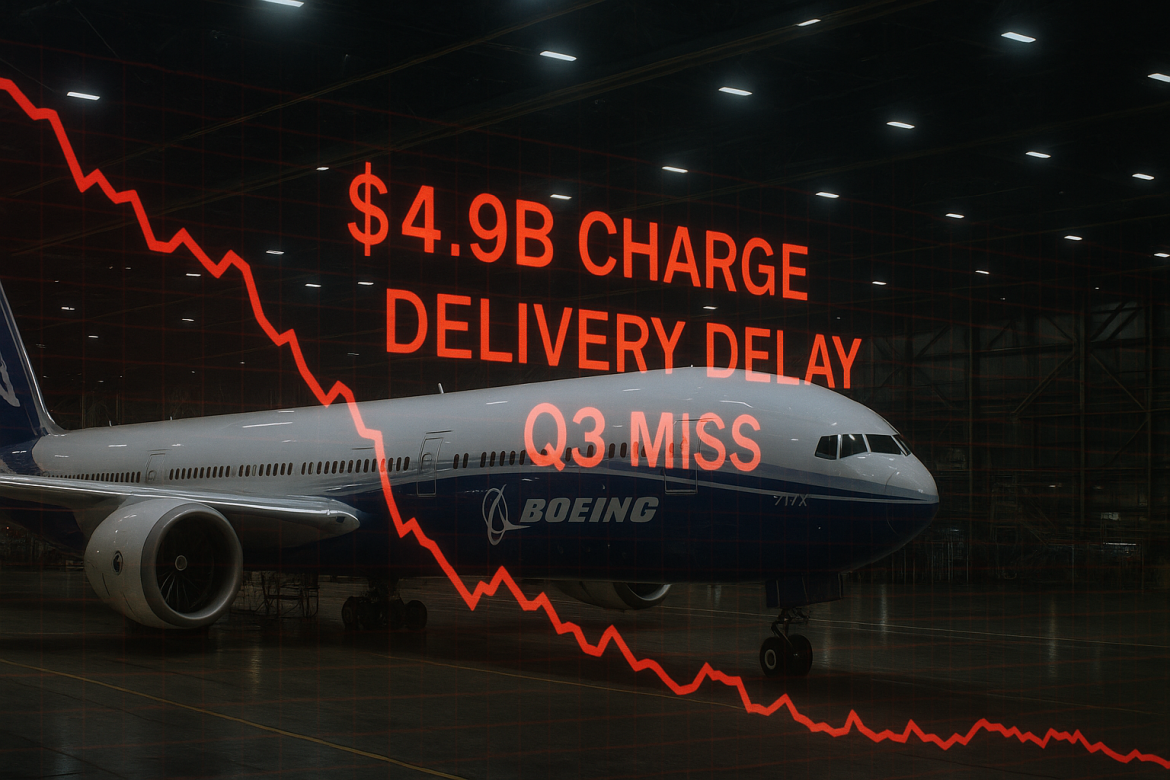Boeing stock (NYSE: BA) tumbled on Wednesday morning after the aerospace giant reported third-quarter earnings that exposed deep operational challenges despite revenue growth.
While the company delivered strong revenues of $23.3 billion, exceeding expectations and reflecting 160 deliveries, the highest since 2018, investors focused on the grim bottom line.
A devastating $4.9 billion charge tied to the perpetually delayed 777X widebody aircraft, combined with a core loss per share of $7.47 that crushed estimates of a $4.44 loss.
The detail sent Boeing stock down over 3% in early trading, highlighting just how significant a setback this program represents.
Boeing stock: What’s behind the decline?
1. Large Q3 earnings miss
Boeing’s earnings print exposed just how troubled the company’s profitability remains beneath the surface of improving production metrics.
The core loss per share came in at $7.47, dramatically missing analyst expectations of a $4.92 loss by over $2.55 per share, one of the largest earnings misses in recent memory for the aerospace company.
Even more concerning, the company’s adjusted EBITDA of -$4.20 billion was significantly worse than the anticipated -$560.1 million, indicating that the underlying business fundamentals are far shakier than recent operational gains suggested.
2. $4.9 billion 777X charge and fresh delivery delay to 2027
The 777X program, already burdened with over $10 billion in accumulated charges and five years of delays, delivered fresh devastation in the form of a nearly $5 billion writedown after Boeing officially pushed first customer deliveries to 2027.
This delay extends the timeline by another year from the previously expected 2026 entry into service, reopening fundamental questions about Boeing’s execution capabilities and regulatory relationships with the FAA.
The sheer magnitude of the charge ($4.9 billion) caught some analysts off guard.
3. Market weighing cash-flow progress against renewed program risk
Perhaps most telling about Wednesday’s market reaction is the disconnect between two narratives.
Boeing did achieve a critical milestone by generating positive free cash flow of $238 million in Q3, marking the first positive quarter since 2023, a genuinely important signal that production improvements and working capital management are beginning to stick.
Operating cash flow surged to $1.12 billion from negative $1.35 billion a year prior, a 183.5% improvement that management highlighted as evidence of structural recovery.
Yet investors treated this cash generation as insufficient to offset the 777X hit.
What analysts say
Analysts reacted to Boeing’s results with a mix of caution and selective optimism.
Morgan Stanley kept an Equal-weight rating and a $235 target, calling the 777X charge a possible short-term reset but warning the long-term cash hit could weigh on the bull case for years unless management provides clarity.
Vertical Research was more upbeat; it upgraded Boeing to Buy and bumped its target to $270, signaling confidence in the recovery story.
Some analysts also went the other way, cutting its target and downgrading the stock, citing weak free cash flow ahead and the risk Boeing may need to issue shares to deal with its heavy debt.
The post 3 key reasons Boeing stock is crashing on Wednesday appeared first on Invezz
